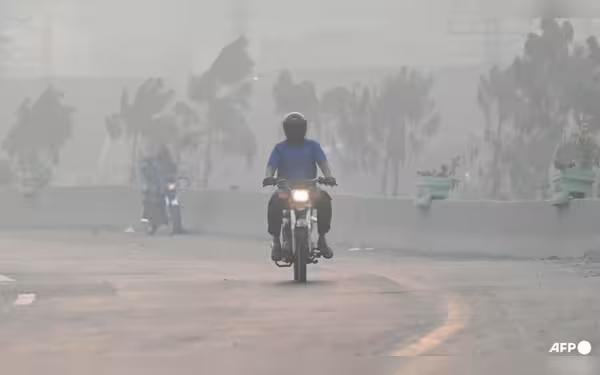Thursday, November 7, 2024 01:38 AM
Lahore Air Pollution Reaches Record High: Urgent Action Needed
- Lahore's AQI hits alarming 1,067, marking a record high.
- Health officials warn of severe health risks from toxic air.
- New restrictions implemented to combat pollution crisis.
 Image Credits: channelnewsasia
Image Credits: channelnewsasiaLahore's air pollution reaches record levels, prompting urgent health warnings and government action to protect residents.
Air pollution has become a pressing issue in many parts of the world, and Pakistan is no exception. In recent years, the megacity of Lahore, the second largest city in Pakistan, has been grappling with severe air quality problems. On November 2, 2023, officials reported that the air pollution levels in Lahore reached alarming heights, marking a record high for the city, which is home to approximately 14 million residents.
The air quality index (AQI) in Lahore soared to an astonishing 1,067, far exceeding the 300 mark that is considered "dangerous." This spike in pollution is attributed to a combination of factors, including low-grade diesel emissions, smoke from seasonal agricultural burning, and the effects of winter cooling. The situation has left many residents feeling anxious and concerned about their health.
Jahangir Anwar, a senior environmental protection official in Lahore, expressed his alarm, stating, "We have never reached a level of 1,000." He further warned that the high pollution levels are expected to persist for the next three to four days. The concentration of PM2.5 pollutants, which are tiny particles that can penetrate deep into the lungs and cause serious health issues, peaked at 610. This is more than 40 times the World Health Organization's (WHO) recommended limit of 15 micrograms per cubic meter for a 24-hour period.
Residents are feeling the impact of this pollution crisis. Lilly Mirza, a concerned mother, shared her worries, saying, "As a mother, I am full of anxiety." She noted that the air quality was not as bad last year, raising questions about what has changed. Many people, like painter Rehmat, feel helpless in the face of this crisis, stating, "What can a poor painter like me do if the government can't fix this? I will keep the mask on and work." This sentiment reflects the frustration and despair felt by many in the city.
The health consequences of breathing in such toxic air are severe. The WHO has linked prolonged exposure to air pollution with serious health conditions, including strokes, heart disease, lung cancer, and respiratory diseases. Children are particularly vulnerable, as their lungs are still developing, and they breathe more rapidly than adults. In response to the worsening air quality, authorities have taken measures such as banning outdoor exercise for schoolchildren until January and adjusting school hours to protect them from the worst pollution.
In an effort to combat the pollution crisis, the provincial environmental protection agency has implemented new restrictions in four pollution hotspots in Lahore. These measures include banning tuk-tuks with polluting two-stroke engines and closing restaurants that do not use filters for barbecuing. Additionally, government offices and private companies are required to have half of their staff work from home, construction work has been halted, and street vendors must close by 8 PM.
The impact of air pollution on life expectancy is staggering. Research from the University of Chicago's Energy Policy Institute indicates that pollution levels exceeding WHO standards can shorten the life expectancy of Lahore residents by an average of 7.5 years. Furthermore, UNICEF reports that nearly 600 million children in South Asia are exposed to high levels of air pollution, with half of childhood pneumonia deaths linked to this issue.
As Lahore continues to battle this pollution crisis, it is crucial for both the government and citizens to work together to find sustainable solutions. Awareness and proactive measures can help mitigate the effects of air pollution, ensuring a healthier environment for future generations. The situation serves as a stark reminder of the importance of clean air and the need for collective action to protect public health.













